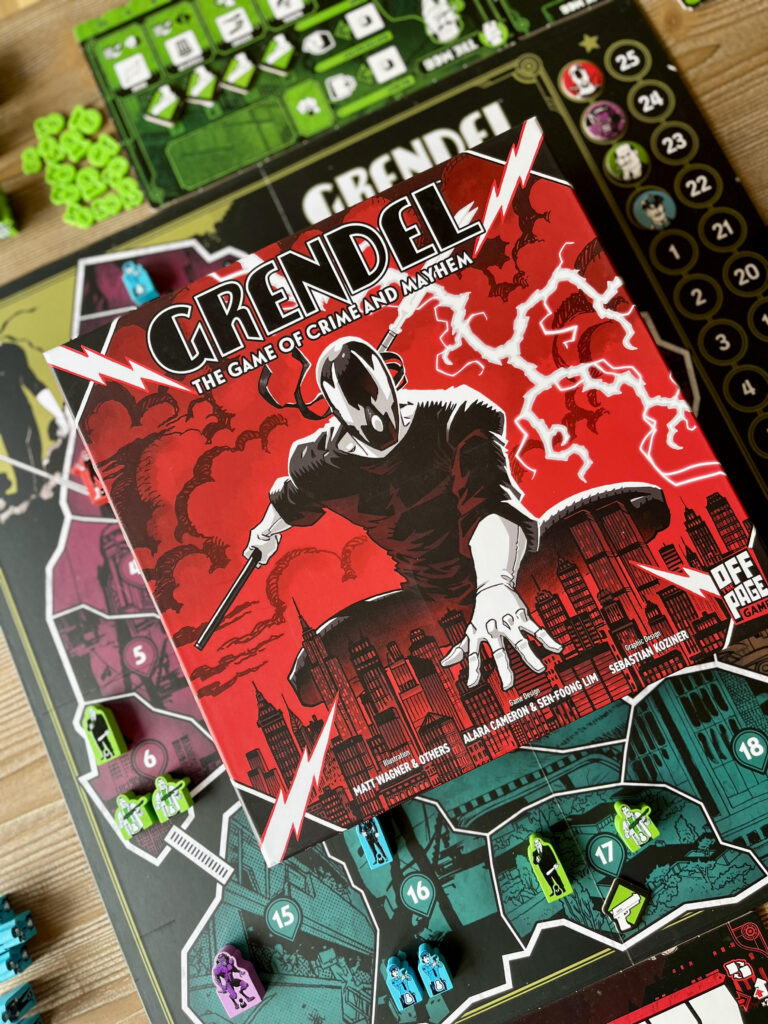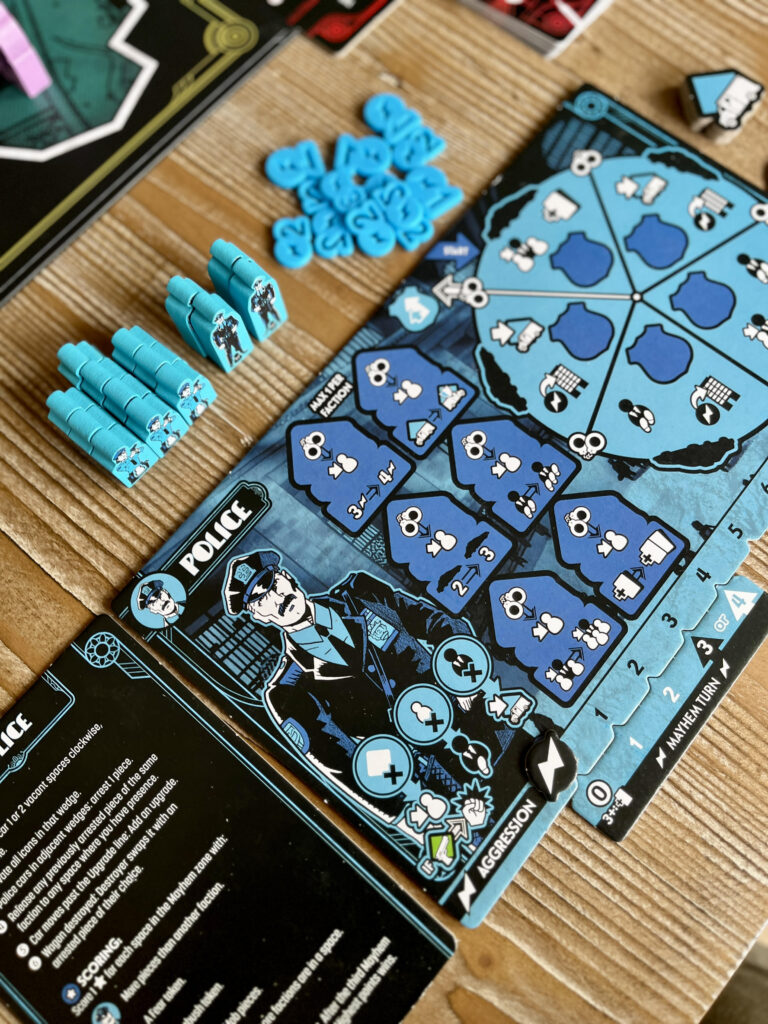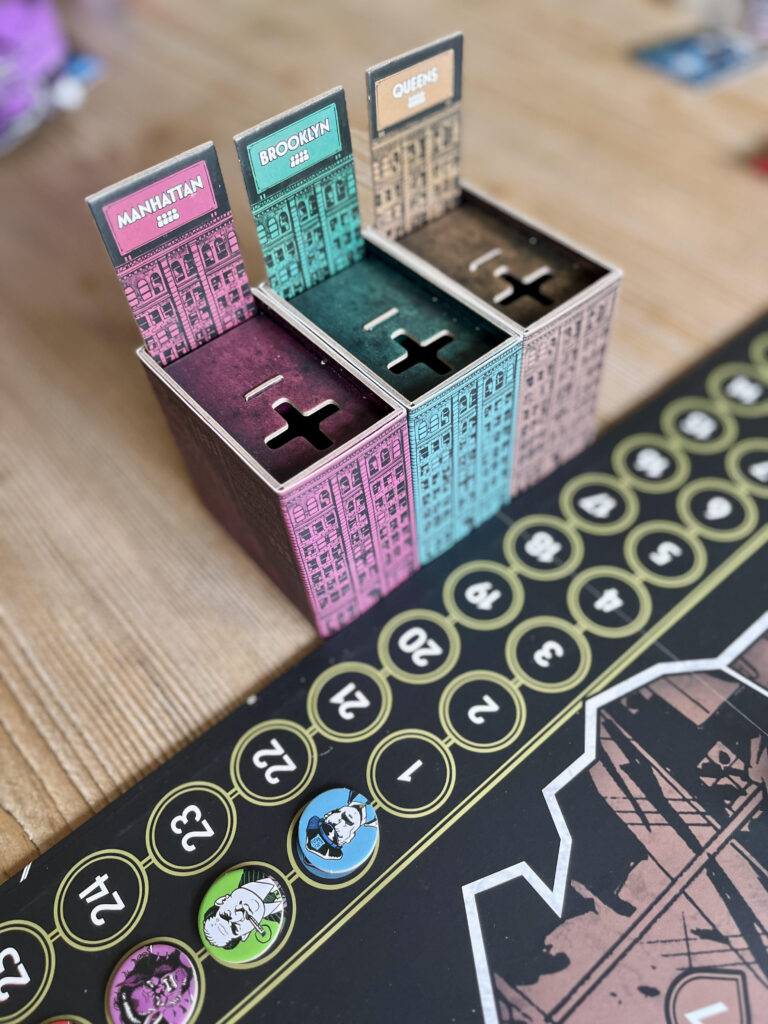Grendel is an asymmetric area control game based on the long-running comic that kicked off back in 1982. The mechanics will feel familiar if you’ve played modern games, but each faction adds its own clever twist, giving the game a fresh, punchy feel.
The story of Grendel is pretty sprawling with different characters taking up the Grendel mantle. But the original is Hunter Rose, a gifted writer and fencer, who becomes a masked assassin and crime lord. His main nemeses are Argent, a wolf-like vigilante who opposes Grendel’s rise in NY; the police, who struggle to stop his influence; and the mob, who he sort of systematically dismantles and takes over to build his own criminal empire.

Each faction leans into a different mechanic:
Grendel uses bag building to fuel his campaign of terror. Every time he wrecks a Grunt or Captain from another faction, he plants a Fear token on the board. That’s the whole goal for him: spread fear, one beatdown at a time to score points.
The Mob is all about dice and dirty deeds. You’ll be rolling dice and assigning them to commit crimes across the city, upgrading your actions as you go. Their main objective is to have at least two different pieces in a space to score points.
The Police run on a rondel. You’ve got two squad cars and you’ll move one of them each turn around a circular action track, one or two spaces. Wherever you land, that’s the action you take. If your cars end up in adjacent spaces, you can make an Arrest. That means plucking an enemy piece off the board and throwing it in jail, which can really mess with opponent plans. The Police score by outnumbering other factions in a space, so these arrests matter.

Argent plays a push-your-luck card game. You flip cards one at a time, each with an action and a number of skulls. If you show four skulls, you bust and have to discard back down to three. You can “Banish” a card each turn to get rid of a skull, but you lose the action too. It’s a balancing act and sometimes the deck hits back.
The game is split into two phases: Planning and Mayhem. During Planning, each player takes turns using their faction’s signature mechanics to jockey for position on the board. Some actions let you drop Aggression tokens into one of three Tower contraptions, each representing a borough of New York: Queens, Brooklyn, and Manhattan.
And these towers are a treat. Off the Page Games always has some clever physical gimmick that really boosts the “play” feeling in their games, and the Aggression towers are maybe my favorite yet (although it’s hard to beat that Corps of Discovery board). You load them up with counters (1s, 2s, and 3s). Interestingly, the 1-point tokens are the heaviest, while 3 is the lightest. Add enough weight, and the tower tips, dropping its counterweight with a satisfying clunk. When that happens, it triggers the Mayhem phase.

In Mayhem, everything changes. Everyone totals up how much Aggression they have in the tower that tipped. That becomes your budget for Mayhem actions. You take turns spending three Aggression at a time (or less if that’s all you’ve got), choosing from a list of spicy new actions like movement, combat, and finally unleashing your extremely powerful faction cards. And here’s the kicker: you score immediately after you’re done spending your points. That’s the only time scoring happens. So timing is everything.
Say you’re eyeing the Mob player. You know they’re about to score and have several spaces with two pieces in the same space. Even if you blast them off the map on your next turn, it’s too late. They already cashed in. It adds a really fun tension to the timing and tempo of the game. And it actually lightens some of the “meanness” of area control games, adding to this game’s accessibility.
Once the Mayhem ends, it’s back to Planning. The cycle continues until all three towers have triggered and been removed. Then there’s a final scoring pass on the whole board to wrap it up.
Despite the chaos, turns don’t feel overwhelming. There’s strategy and thinking, but it never melts your brain. It’s surprisingly approachable.
When I think of asymmetric area control, my first thought is Root. I love Root. It’s my all-time favorite game. And while it’s brilliant, it’s also a bear to teach. Grendel feels like a gentler entry into the world of asymmetric design. You don’t need to know every detail about every faction. Just understand their win conditions (which are all quite simple) and you’ll know how to push back. I may not know all of Grendel’s action possibilities, but I know I don’t want him spreading Fear tokens. That’s enough to act on.
As for balance, it’s hard to say this early with a prototype. But nothing felt wildly off. Every faction was in the mix.
This is a great introduction to asymmetry for newer players, with plenty of depth for seasoned fans as well. The faction designs are full of flavor and creativity, offering distinct playstyles that feel thematic without requiring any familiarity with the Grendel comic. That accessibility is a strength, though it also means the mechanics could have worked with a variety of themes, making the connection to the source material feel maybe a bit less essential than in other Off the Page titles. Still, the gameplay shines. Swapping factions each session gives you a fresh puzzle to unravel, but there’s plenty of room for improvement with each.
It’s best at three or four for maximum chaos, but I also played a two-player game and had a blast. The factions you’re not using still appear on the board as passive pieces. They add friction to keep things interesting and give you ways to score.
Grendel is clever, wild, and just structured enough to hold together while everything explodes around it. A strong addition to the Off the Page lineup.
Thank you to Off The Page Games for a temporary prototype copy.